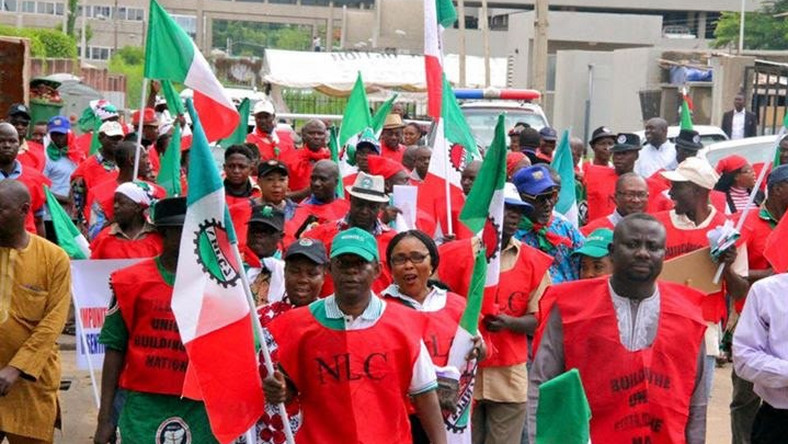The Nigeria Labour Congress (NLC) has vowed to ground the economy as it says the stage is set for a two-day nationwide warning strike in response to the severe economic hardships plaguing the nation on the aftermath of subsidy removal by the Federal Government.
This move has garnered widespread support from key stakeholders, including the banking sector, civil society organisations, and workers’ unions, as they unite to address the growing economic crisis in the country.
The National Union of Banks, Insurance and Financial Institutions Employees (NUBIFIE), the umbrella organisation representing workers in the banking and insurance industry, on Monday vowed to take part in the strike, effectively shutting down financial activities across Nigeria.
A statement signed by the General Secretary of NUBIFIE, Mr. Mohammed Sheikh, underscored the importance of their participation in the two-day warning strike by the NLC, citing the need to draw the government’s attention to the dire economic situation faced by Nigerians.
The leadership of NUBIFIE has issued a notice that all banks will be shut down on Tuesday, 5 and Wednesday, 6 September 2023, in line with the NLC two-day strike directive.
READ ALSO: http://EFCC arrests 20 for alleged internet fraud in Ibadan
“The directives are imperative to get the needed attention of the government and to warn it against interfering in the internal affairs of unions instead of addressing the punishing economic circumstances we find ourselves in,” the statement emphasised.
Speaking with newsmen, the Senior Deputy General Secretary of NUBIFIE, Mr. Aboderin Olusola, reiterated their commitment to the NLC’s cause, stressing the necessity of solidarity among industrial unions during these trying times.
Olusola said, “It was NLC’s directive to all the industrial unions and NUBIFIE didn’t have any option than to issue that circular to all our members and management of banks and insurance companies in Nigeria.”
Joining the chorus of concern, the United Action Front of Civil Society has thrown its full support behind the NLC’s two-day warning strike.
In a statement signed by the Head of the National Coordinating Centre for the United Action Front of Civil Society, Wale Okunniyi, the organisation expressed outrage over the hardship inflicted on Nigerians by the government’s decision to remove fuel subsidies and subsequently raise the price of premium motor spirit.
The Maritime Workers Union of Nigeria has backed the Nigerian Labour Congress to embark on the two-day warning strike.
This was contained in a letter on Monday titled, ‘Compliance to the Nigerian Labour Congress directive on a nationwide two-day warning strike’, signed by the Head of Media, MWUN, John Ikemefuna.
READ ALSO: http://PEPT: Bode George calls for fresh election
NLC in a communiqué jointly signed by its National President, Joe Ajaero and Secretary, Emmanuel Ugboaja, said it decided to embark on a two-day warning strike following what was described as the failure of the Tinubu-led Federal Government to dialogue and engage stakeholders within the organised labor on efforts to cushion the effects of fuel subsidy removal on Premium Motor Spirit, popularly known as petrol, on the “poor masses”.
The President General of MWUN, Adewale Adeyanju, directed all its affiliates to embark on the two-day nationwide strike.
He said, “This decision is due to the Federal Government’s refusal to engage and reach an agreement with the organized labor on critical issues of the consequences of the unfortunate hike in the price of petrol, which has unleashed massive suffering on Nigerian workers and the generality of the Nigerian citizens.”
“The MWUN as an affiliate of the NLC, is obliged to comply with the directive and has consequently instructed all our members in all ports, jetties, terminals, and oil and gas platforms nationwide to partake on the two days total shut down warning strike as directed by the NLC.”
As the strike’s commencement nears, the Federal Government has issued an appeal, imploring organised labour to reconsider the planned nationwide two-day warning strike.
This appeal came as support for the strike grows among various unions and civil society allies, including the Academic Staff Union of Universities, Academic Staff Union of Polytechnics (ASUP), Non-Teaching Staff of Universities, and NUBIFIE.
The Minister of Labour and Employment, Simon Bako Lalong, emphasised that the government has already taken measures to mitigate the impact of the fuel subsidy removal, which is being implemented at all levels of government.
YOU MAY ALSO LIKE: http://Ogun community appreciates Gov. Abiodun on electrification project
He stressed the importance of maintaining industrial harmony and preventing disruptions that could jeopardise the government’s ongoing efforts.
“In this context, it has become pertinent to appeal to the leadership of the Nigeria Labour Congress to suspend its intended two-day warning strike, as such action would be detrimental to the gains already being made in securing a better future for Nigerian workers and citizens at large,” Lalong pleaded.
Meanwhile, the national leadership of the NLC has shunned the last-minute reconciliatory meeting convened by the Minister, with the purpose of averting the two-day warning strike already declared by the labour centre.
Only the leadership of the Trade Union Congress by its President, Festus Osifo, showed up for the meeting slated for 3pm but started at exactly 5:32pm.
A member of the NLC national leadership told our correspondent that the decision of the NLC to boycott the meeting was because ongoing negotiations could stall a possible strike.
“The strike will still go on. If the leadership had attended the meeting, move to go on strike would have been stalled. It would have amounted to a form of negotiation.”
The NLC’s call for a nationwide strike has clearly resonated with many Nigerians grappling with economic hardships.
The widespread support from unions, civil society, and the public underscores the mounting frustration with government policies perceived as worsening the plight of ordinary citizens.
In the coming days, all eyes will be on how this unfolding drama of protest and appeal unfolds on the streets and within the corridors of power, shaping the nation’s response to its ongoing economic turmoil.


